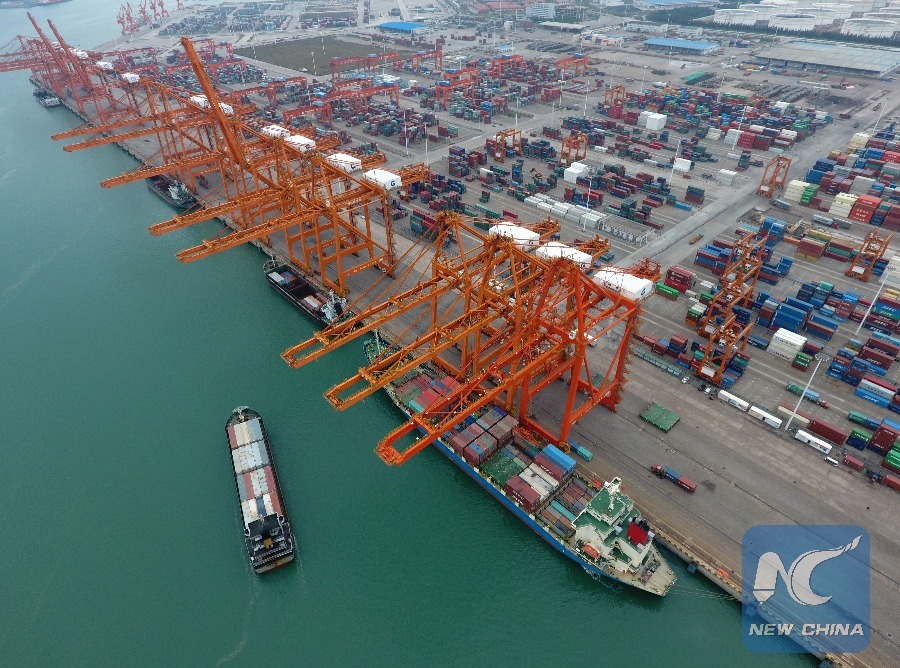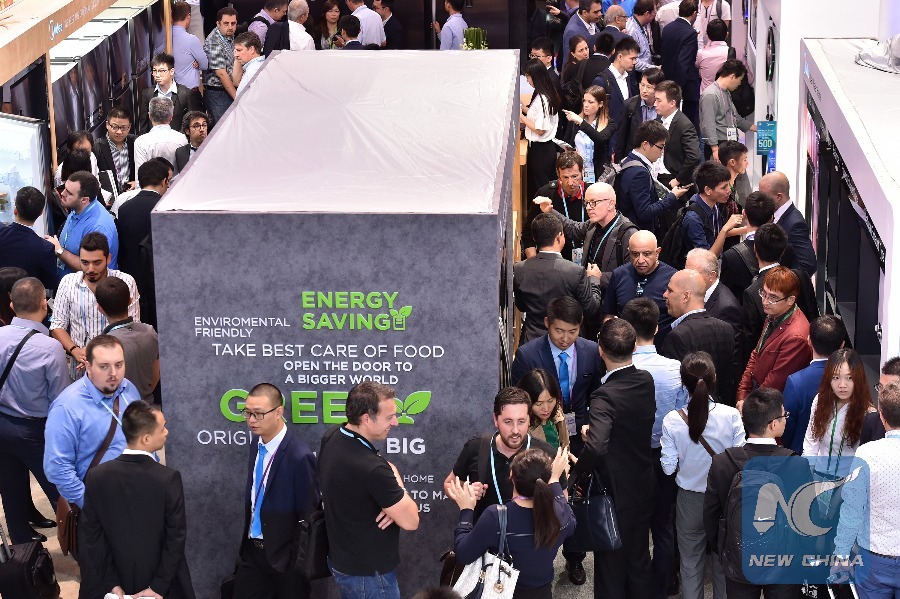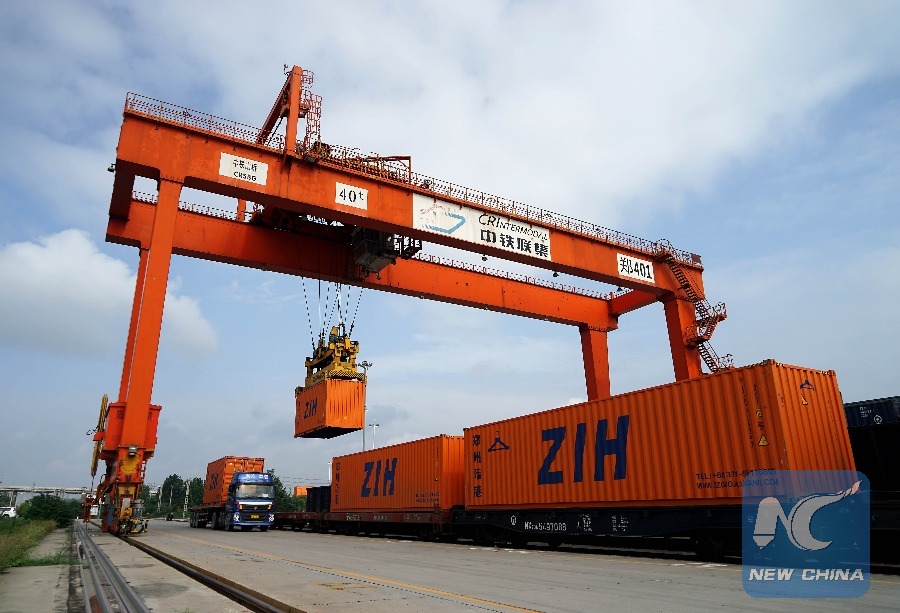
Qinzhou Port is seen in Qinzhou City, south China's Guangxi Zhuang Autonomous Region, Jan. 10, 2018. (Xinhua/Lu Boan)
by Xinhua writer He Fei
BOAO, China, April 11 (Xinhua) -- Chinese President Xi Jinping's latest pledge of further opening-up made at Asia's top economic forum has offered a much-needed boost to global confidence in building an open, all-win world economy.
Leaders and observers across the world have said that the speech Xi delivered Tuesday at the Boao Forum for Asia (BFA) is particularly reassuring in the face of the alarming rise of protectionism and isolationism in some advanced economies.
CHAMPION OF OPENNESS
Summarizing the historical progress made since China adopted its reform and opening-up policy in 1978, Xi said "China's reform and opening-up meets its people's aspiration for development, innovation and a better life. It also meets the global trend toward development, cooperation and peace."
Contributing over 30 percent of global growth, China has recorded an average of 9.5 percent annual growth in the past four decades, Xi said, adding that more than 700 million Chinese people have been lifted out of poverty, accounting for more than 70 percent of the global total over the same period.
"The Chinese people have emerged from a life of shortages and poverty and are now enjoying abundant supply and a moderately prosperous life," he said at the forum, which is themed "An open and innovative Asia for a world of greater prosperity."

Tourists taste coconut in Xiaomei Village, Lingshui Li Autonomous County, south China's Hainan Province, Jan. 21, 2018. After local government's targeted measures in poverty alleviation work, the improved environment in Xiaomei Village, once an impoverished village, now attract more tourism business for local people. (Xinhua/Zhao Yingquan)
Leslie Maasdorp, vice president of the BRICS New Development Bank, said the forum comes at "a very interesting inflection point for China and for the region" as this year marks the 40th anniversary of the country's reform and opening-up.
Praising the Asian country's remarkable achievements in poverty elimination, Maasdorp said he considers China's past four decades a success -- its economy has grown, key infrastructure is being upgraded, and technology has enabled big companies such as Alibaba and Tencent to thrive.
Zheng Yongnian, director of the East Asian Institute at the National University of Singapore, said China's reform and opening-up has not only changed China's relations with the world, but provided a paradigm for other nations to achieve openness and prosperity.
Yasuo Fukuda, chairman of the BFA and former Japanese prime minister agreed, saying China's experience in implementing structural reform and dealing with globalization sets good examples for developing countries to avoid obstacles in pursuing development.
GROUNDBREAKING NEW MEASURES
What attracted the most attention from forum attendees and analysts has been a set of groundbreaking new measures Xi unveiled to consolidate China's past success and further expand the country's reform and opening-up. In his speech, Xi announced that China will significantly broaden market access, create a more attractive investment environment, strengthen the protection of intellectual property rights, and take the initiative to expand imports.

Traders attend the Canton Fair in Guangzhou, capital of south China's Guangdong Province, Oct. 15, 2017. The China Import and Export Fair is held every spring and autumn and is seen as a barometer of the country's foreign trade. (Xinhua/Liang Xu)
New steps to be taken include reducing import tariffs for vehicles and some other products, and seeking faster progress toward joining the World Trade Organization Government Procurement Agreement, among others.
Sourabh Gupta, senior fellow at the Institute for China-America Studies in Washington, D.C., said "the specific and achievable measures" provide a "tangible basis to assess the continuing commitment to openness" of China.
"It was reassuring to hear President Xi speak in a measured but firm tone that China will not be deflected from the path of openness and globalization," after a series of protectionist measures were taken by the United States, he said.
Sorao Sugiyama, attache at the Japanese Consulate-General in China's southern city of Guangzhou, said Xi's proposals at the forum are "very significant."
Saying that Japan wants to expand its overseas market due to a shrinking population, Sugiyama said China's markets are important to Japan especially when trade policies in some countries are turning protectionist.
COMMON PROSPERITY
At the Boao gathering, where world leaders compare notes on development on an annual basis, Xi called on all to build a community with a shared future for mankind and make Asia and the world peaceful, prosperous and open.
Gerhard Stahl, former secretary-general of the European Committee of the Regions, said Europe should not perceive China as a threat, but understand that economic progress in China benefits the whole world.
This is especially the case with the Belt and Road Initiative, he said.
Since it was proposed in 2013, the initiative has seen more than 80 countries and international organizations signing cooperation agreements with China.

Containers are loaded onto a China-Europe freight train in Zhengzhou City, capital of central China's Henan Province, Aug. 2, 2017. (Xinhua/Li An)
Cooperation between Europe and Asia was hampered by administrative barriers and a lack of transport and communication infrastructure, while the initiative is a comprehensive plan addressing all the impediments, Stahl said.
Singaporean Prime Minister Lee Hsien Loong said the initiative and the Asian Infrastructure Investment Bank are "two major efforts by China to contribute to the regional structure and regional prosperity."
While elaborating on the flagship initiative, Xi said it may be China's idea, but its opportunities and outcomes will benefit the world, adding that China has no geopolitical calculations, seeks no exclusionary blocs and imposes no business deals on others.
"With the future in mind, we need to treat each other with respect and as equals," said Xi, who also called for shared responsibility, harmony without uniformity, and respect for nature.
Stahl said Xi's speech "offers the right method: to succeed in the cooperation we have to understand and respect the different situations, to advance we have to agree on common rules and standards."
More importantly, said Gupta, "President Xi stretched out his hand to any and all takers who wish to reach out and pursue a win-win economic relationship with China."
(Wang Shang, Tamara Treichel, Liu Chang, Kang Yi, Liu Hua, Zhou Zhengping in Boao, Yang Shilong in New York, and Zheng Jianghua in Brussels contributed to the story.)

